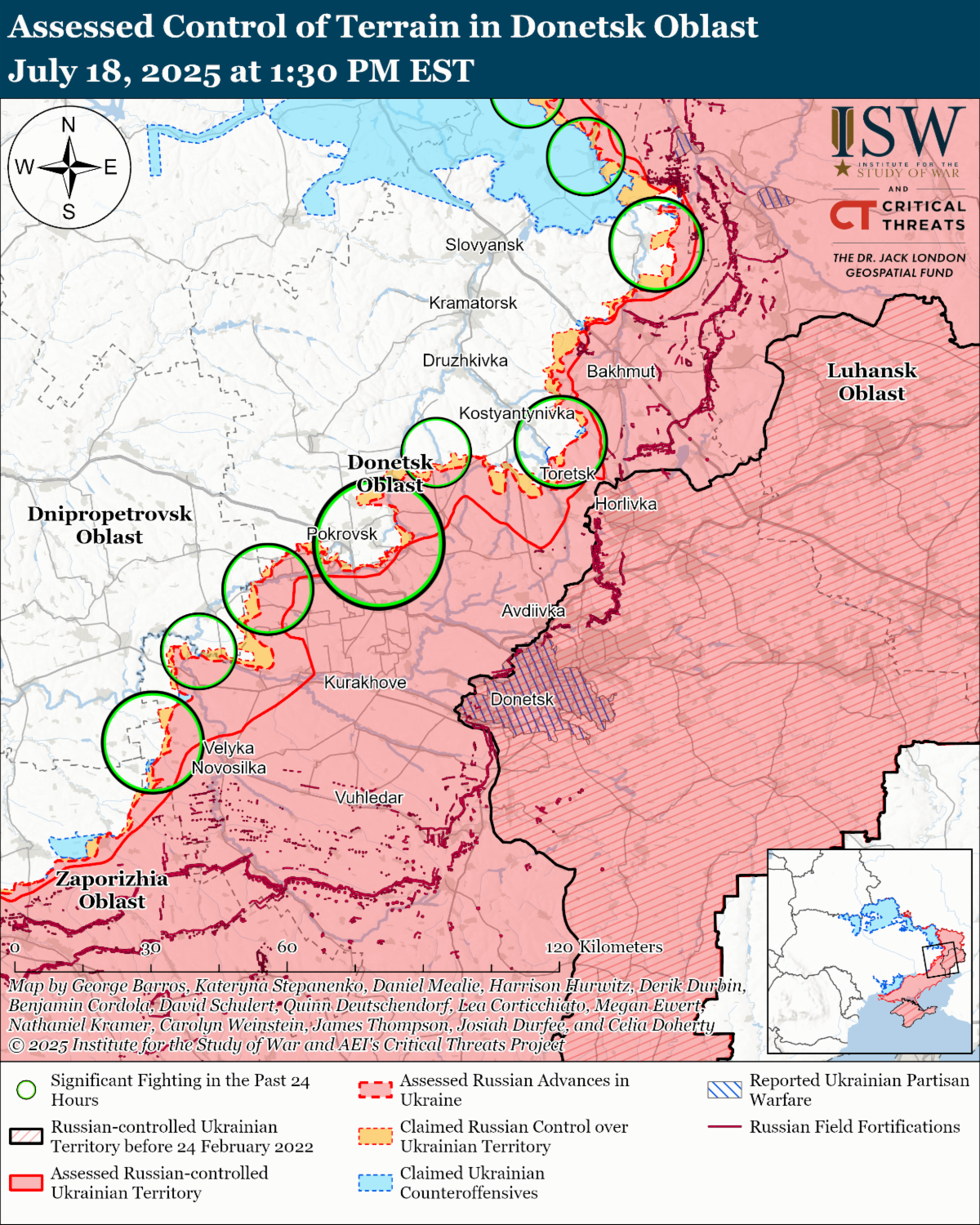The European Council of the European Union (EU) approved its 18th sanctions package on July 19, mainly targeting Russian oil revenues and sanctions evasion schemes. The EU announced a landmark oil cap to contain Russian oil prices at 15 percent of the average market price that will automatically adjust semi-annually, and noted that the current price cap is set at $47.60 per barrel – well below the previous $60 per barrel cap. The EU imposed a full transaction ban on any transactions related to the Nord Stream 1 and 2 pipelines, which will prevent the completion, maintenance, and operation of the pipelines. The EU also ended Czechia's exemptions for Russian oil imports. The EU sanctioned an additional 105 vessels of the Russian shadow fleet, increasing the overall number of sanctioned tankers to 444. The EU sanctioned Russian and international companies managing the shadow fleet, an oil refinery in India in which the Russian state oil company Rosneft is a main shareholder, the captain of a shadow fleet vessel, a private operator of an international flag registry, and one entity in the Russian liquefied natural gas (LNG) sector. The EU also imposed an import ban on refined petroleum products made from Russian crude oil and imported from any third country, with the exception of Canada, Norway, Switzerland, the United Kingdom, and the United States. The Russian government reportedly accounted for some decrease in oil and gas revenue as part of Russia's upcoming national budget, although the EU oil cap and shadow fleet sanctions will likely further degrade Russian oil revenues beyond what the Kremlin previously expected. The EU measures target both Russia’s current ability to sell oil at advantageous pricing and undermines Russia's long-term ability to sell oil to Europe. The EU noted that oil revenues constitute one-third of Russia’s overall revenue, and that recent declines in Russia’s oil revenues in combination with a decrease in market earning potential poses a risk to the Russian federal budget.
The EU's new sanctions target Russia’s ability to engage with international markets. The EU fully banned EU-based specialized financial messaging services from conducting transactions with 22 Russian banks, in addition to the 23 previously sanctioned Russian banks already subject to the ban. The European Union lowered the threshold for sanctioning third-country financial, credit, and crypto-asset service providers that are connected to the Russian Central Bank’s System for Transfer of Financial Messages (SPFS) or generally supporting Russian sanctions evasion schemes. The EU banned any transaction with the Russian Direct Investment Fund (RDIF), its sub-funds and companies, and any companies investing in or owned by the RDIF. The EU also banned the sale, supply, transfer, and export of software management systems and banking and financial sector software to Russia. The EU sanctions target an existing vulnerability within the Russian banking and financial sector, decreasing Russia’s ability to maintain a strong presence in international trade and diversify its economy.
The EU's new sanctions package also targets actors directly supporting Russian military capabilities. The EU sanctioned three entities based in the People's Republic of China (PRC) and eight companies operating in Belarus that sell goods to the Russian military. The EU also imposed a full transaction ban on Belarusian specialized financial messaging services and embargoed arms imports from Belarus. The EU tightened export restrictions on 26 entities involved in dual-use goods and technologies, including 11 entities in third countries other than Russia. The EU approved over 2.5 billion euros worth of other export bans on items that could support Russia's war effort, including computer numerical control machines and chemicals for propellants. The EU also sanctioned several individuals involved in indoctrinating Ukrainian children, crimes in occupied Ukraine, and spreading Russian propaganda.
Key Takeaways:
- The European Council of the European Union (EU) approved its 18th sanctions package on July 19, mainly targeting Russian oil revenues and sanctions evasion schemes.
- Russian officials continued to falsely claim that sanctions do not have an impact on the Russian economy in response to the EU's new sanctions package.
- Select Russian officials are acknowledging the impact of sanctions on the Russian economy despite the Kremlin's efforts to disguise and dismiss such impacts.
- Ukrainian President Volodymyr Zelensky appointed former Defense Minister Rustem Umerov as Secretary of the National Security and Defense Council on July 18.
- The Kremlin continues to advance its long-term censorship efforts to assert greater control over the Russian online information space.
- Ukrainian forces recently advanced near Novopavlivka. Russian forces recently advanced in northern Sumy Oblast and near Pokrovsk.
| 




 [ISW] 러시아 공세 캠페인 평가, 2025년 7월 19일
[ISW] 러시아 공세 캠페인 평가, 2025년 7월 19일
 [ISW] 이란 업데이트, 2025년 7월 18일
[ISW] 이란 업데이트, 2025년 7월 18일